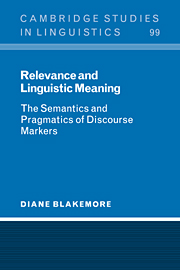3 - Relevance and meaning
Published online by Cambridge University Press: 18 December 2009
Summary
Relevance and the semantics/pragmatics distinction
Relevance theory is known as a theory of pragmatics, and, indeed, Sperber and Wilson regard their book as a result of their different interests in the study of contextual factors in verbal communication – in Wilson's case, an interest which began with her work on presuppositions (Wilson 1975), and in Sperber's, an interest in rhetoric and symbolism (Sperber 1975); (see Sperber and Wilson 1995: vi). However, as we have seen, it is impossible to have a view of pragmatics without having a view of semantics, or vice versa, and it is not surprising that the relevance theoretic approach to pragmatics comes with a view of semantics attached. My aim in this chapter is not to give a complete survey of relevance theory, but to outline those aspects which underlie the account of non-truth conditional meaning which I shall be giving in the next chapter. This will mean that the focus will be on the relevance theoretic view of the semantics/pragmatics distinction, the distinction between explicit and implicit content and the relationship between linguistic form and relevance which derives, on the one hand, from the relevance theoretic commitment to a computational view of the mind, and on the other, from the principle which, according to relevance theory, constrains the inferences involved in understanding utterances.
Usually, pragmatics is defined after semantics. That is, its definition is thought of as being a consequence of the way one defines semantics.
- Type
- Chapter
- Information
- Relevance and Linguistic MeaningThe Semantics and Pragmatics of Discourse Markers, pp. 59 - 88Publisher: Cambridge University PressPrint publication year: 2002



